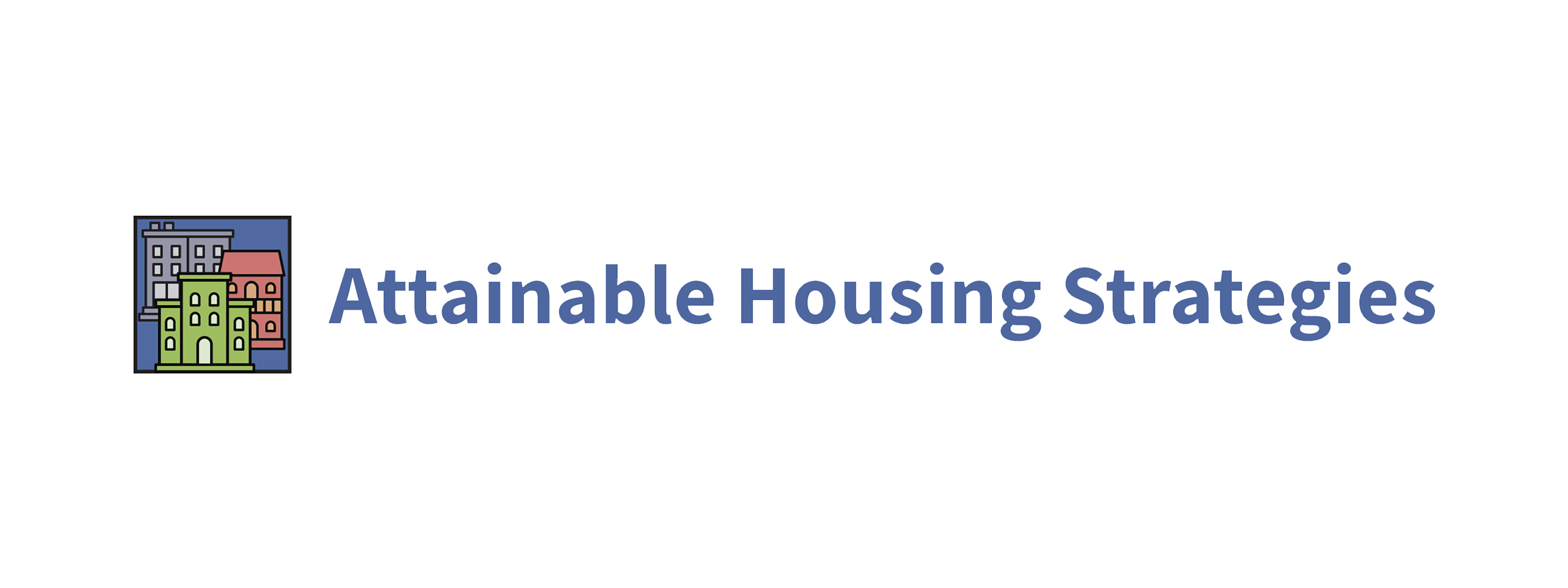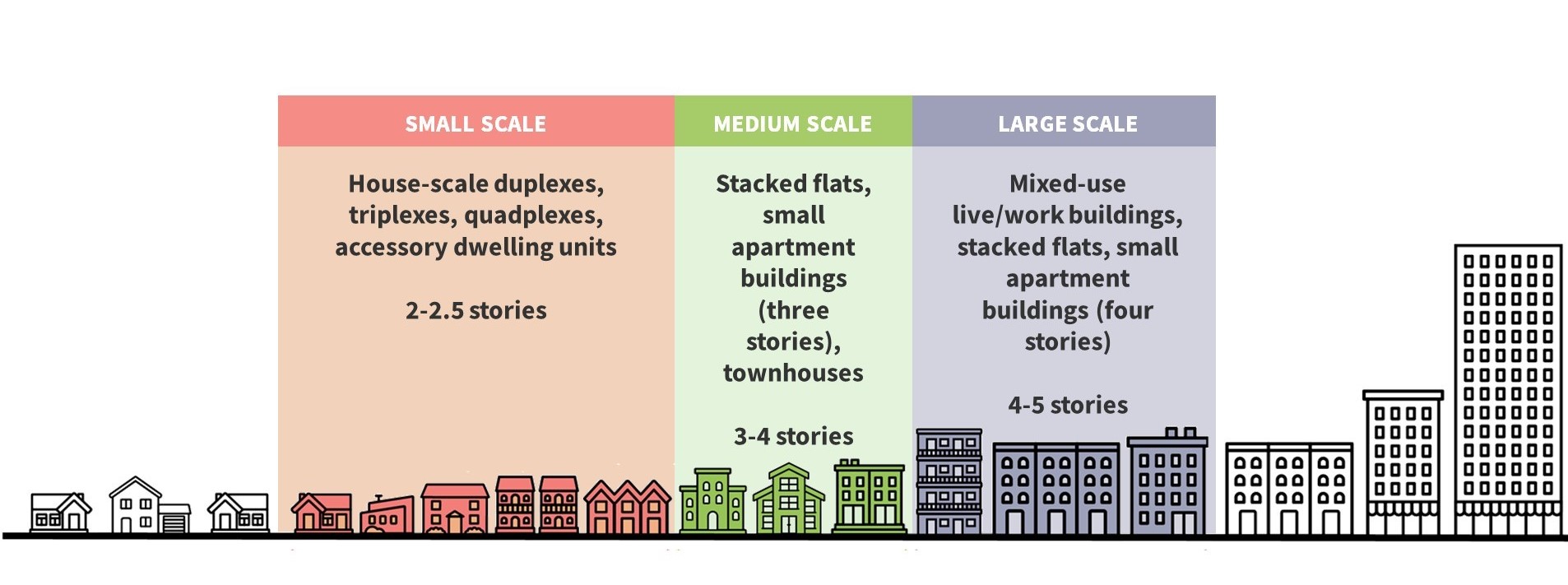
Deadline to sign up to provide comments at the virtual Planning Board meeting is Wednesday, June 23 at noon
WHEATON, MD – The Montgomery County Planning Department, part of The Maryland-National Capital Park and Planning Commission (M-NCPPC), will present preliminary recommendations for the Attainable Housing Strategies initiative to the Montgomery County Planning Board on Thursday, June 24 at their virtual meeting. Community members are invited to provide comments virtually to the Planning Board at the meeting. The deadline to sign up to provide comments is Wednesday, June 23 at noon.
- Sign up to provide comments for the June 24 Attainable Housing Strategies initiative.
- View the Attainable Housing Strategies initiative staff report.
Preliminary Attainable Housing Strategies initiative recommendations include:
- In the R-40, R-60, R-90 and R-200 zones, allow house-scale duplexes and triplexes by-right and allow quadplexes by-right in areas closer to transit. In all cases, require conformance with a Planning Board-approved pattern book, which will give guidance on massing, scale, and design to ensure these housing types blend in among single-family homes.
- Create a new optional method of development to encourage consolidation and development of duplexes, cottage courts, townhouses, and small multiplexes and apartments near transit, along the Thrive Growth Corridors, and near the county’s centers of activity.
- Support more corridor-focused master plans to identify locations ideal for large scale attainable housing, including townhouses, stacked flats, and apartments along select growth corridors.
- Modify parking standards for attainable housing units to right-size the parking demand and supply.
- Create a new minor subdivision type for the small scale attainable housing.
The preliminary recommendations for the Attainable Housing Strategies initiative support the housing recommendations in the update to the county’s General Plan, known as Thrive Montgomery 2050. Review the short Attainable Housing Strategies initiative explainer in English and in Spanish.
The Planning Board will hold work sessions with Planning staff in July 2021 to discuss the recommendations of the Attainable Housing Strategies initiative. The community is invited to submit written comments to the Planning Board via email at mcp-chair@mncppc-mc.org. Following Planning Board review and approval, the Attainable Housing Strategies recommendations are expected to be transmitted to the County Council later in July. Those recommendations will potentially be taken up after the Council worksessions for Thrive Montgomery 2050 are completed in the fall.
About Attainable Housing Strategies
The Attainable Housing Strategies effort was launched at the direction of the Montgomery County Council on March 4, 2021 to “consider zoning reforms that would allow greater opportunities for Missing Middle housing in Montgomery County.” Since that time, Montgomery Planning staff has been reviewing zoning and planning policies and conducting community outreach to come up with a comprehensive strategy for providing options for residents to find homes at the right sizes, locations and price points for their needs in Montgomery County. Attainable housing offers more diverse types of housing beyond single family homes and large apartment buildings. This effort includes Missing Middle Housing, which refers to a range of building types that are compatible in scale, form and construction with single-family homes, but offer multiple housing units. Attainability in housing is the ability of households of various incomes and sizes to obtain housing that is suitable for their needs and affordable to them.
As noted in Montgomery Planning’s recent Montgomery County Housing Needs Assessment, county residents have a wide range of housing needs related to size, transit access, and price, yet almost half of the homes in Montgomery County are single-family houses. The Attainable Housing Strategies initiative aims to identify viable housing options for existing and new residents at the right size, location, and price point for their needs. This is critical as Montgomery County will need to increase its housing supply to meet the demand of an estimated 200,000 more residents by 2045. Strategies to implement Missing Middle housing are a major part of this effort, as are opportunities for new housing around transit stations, within transit corridors, and near activity centers across the county. The Attainable Housing Strategies effort, as part of Montgomery Planning’s Equity Agenda for Planning initiative, also helps to create more equitable, mixed-income communities. More details on the Attainable Housing Strategies initiative, including Frequently Asked Questions, can be found on Montgomery Planning’s website.

To inform development of recommendations, Montgomery Planning has provided the community with multiple opportunities to provide feedback. Videos and presentations from three community meetings and four Housing Equity Advisory Team (HEAT) stakeholder meetings are available on the Attainable Housing Strategies Initiative website. Montgomery Planning also provided office hours on June 3, held a Twitter “Housing Day” on June 14 and ran a social media campaign requesting community members to share their #MyMoCoHome stories. Additionally, Montgomery Planning staff have met with several community and other organizations to discuss the Attainable Housing Strategies initiative.
Thrive Montgomery 2050 and Attainable Housing Strategies
In April 2021, the Planning Board approved and transmitted to the County Council its draft of Thrive Montgomery 2050,the update to Montgomery County’s General Plan. The General Plan is the county’s long-range policy framework for guiding future land use and growth for the next 30 years. The County Council held a public hearing on June 17 on the Thrive Montgomery 2050 Planning Board Draft Plan and will hold a second public hearing on June 29. In many ways, Attainable Housing Strategies represents the first opportunity to implement elements of Thrive Montgomery 2050. The Planning Board draft of Thrive Montgomery 2050 recommends policies and actions to support the production of more housing, including a wide range of housing types and sizes to meet diverse needs. These policies and actions include:
- Expand opportunities to increase residential density, especially along major corridors and in locations where additional housing can assist in the development of Complete Communities.
- Facilitate the development of a variety of housing types in every part of the county but especially in areas near transit, employment, and educational opportunities. Support creative housing options that promote racial and economic diversity in every neighborhood.
About the Equity Agenda for Planning
Montgomery Planning recognizes and acknowledges the role that our plans and policies have played in creating and perpetuating racial inequity in Montgomery County. We are committed to transforming the way we work as we seek to address, mitigate, and eliminate inequities from the past and develop planning solutions to create equitable communities in the future. While it will take time to fully develop a new methodology for equity in the planning process, we cannot delay applying an equity lens to our work. Efforts on the Equity Agenda for Planning to date include:
- Developing an Equity Agenda for Planning. The Planning Board approved Equity in Master Planning Framework, and staff is working on action items.
- Equity Focus Area Analysis. Montgomery Planning identified and analyzed the Equity Focus Areas of the county and developed a mapping tool that will guide planning efforts to foster more equitable outcomes for communities in Montgomery County.
- Prioritizing equity in Thrive Montgomery 2050. Community Equity is one of the three priority areas of our county General Plan update, Thrive Montgomery 2050.
- Focusing on equity in upcoming plans. Equity is a central focus of the Silver Spring Downtown and Adjacent Communities Plan, the first master plan to launch since Montgomery County’s Racial Equity & Social Justice Act passed. All upcoming plans and studies will have an equity focus.
- Viewing management and operations through an equity lens. Our efforts are not limited to the master planning process. Management and operational functions like communications and human resources are developing approaches, tools, plans, and training to ensure that we look at everything through an equity lens.